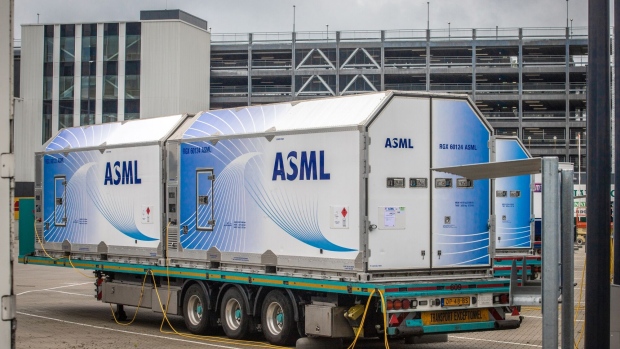Jan 24, 2024
ASML Orders Triple as Demand for Most Sophisticated Gear Soared
, Bloomberg News

(Bloomberg) -- ASML Holding NV closed at a record high after its orders more than tripled last quarter, in a sign that parts of the semiconductor industry are resurgent.
Order bookings rose to a record €9.19 billion ($9.98 billion) in the fourth quarter from €2.6 billion in July to September, driven by demand for its most sophisticated machines, Europe’s most valuable technology company said in a statement on Wednesday.
Shares closed up 9.7% at a record €775.80 in Amsterdam.
ASML is the only company that produces equipment needed to make the most sophisticated semiconductors, and demand for its products is a bellwether for the industry’s health. Record orders for its top-of-the-line extreme ultraviolet lithography machines show optimism among the biggest customers for the technology, including Intel Corp., Samsung Electronics Co. and Taiwan Semiconductor Manufacturing Co.
Artificial intelligence, which requires massive amounts of computing power, is going to be a “big driver for our business and the business of our customers,” Chief Executive Officer Peter Wennink said in an interview on Bloomberg TV.
Some chipmakers are increasingly optimistic the sector’s outlook following a slump that dates back to the Covid-19 pandemic, with TSMC last week projecting strong revenue growth in 2024.
However, demand in other parts of the industry remains weak. Texas Instruments Inc. shares slid 2.8% in premarket trading on Wednesday after it gave a disappointing quarterly forecast, indicating that sales of chips for industrial and automotive uses haven’t recovered.
ASML’s bookings last quarter were far more than an average estimate of €3.6 billion by analysts surveyed by Bloomberg. Orders of its most advanced EUV lithography machines in the period were €5.6 billion.
“The inventory levels in the end markets are improving and are definitely at a better level than they were a couple of quarters ago,” Chief Financial Officer Roger Dassen said in a statement accompanying the earnings result.
ASML’s results are the latest sign that a recovery for the chipmaking sector is underway. The Semiconductor Industry Association said this month estimated chip sales increased in November after more than a year of declines.
Net sales rose to €27.6 billion last year, an increase of 30% from 2022, the company said.
“2023 was our top year,” Wennink said. “We won’t see another 30% growth in 2024.” ASML has previously forecast flat growth this year before a banner year in 2025.
ASML also benefited from strong demand from China last year as chipmakers there rushed to get lithography machines ahead of Dutch export rules meant to hobble Beijing’s semiconductor ambitions. The rise in Chinese demand helped offset the effects of a global chip industry slowdown on ASML, which is the only producer of the equipment needed to produce most advanced semiconductors.
“The market had been anticipating an order upturn” in the first half of 2024 but it arrived sooner, Citigroup Inc. analysts including Andrew Gardiner said in a note to clients. Citigroup expects the orders in the fourth quarter to “give the market confidence in expecting strong growth in 2025 and for shares to appreciate accordingly.”
China accounted for 39% of ASML’s sales in the fourth quarter and became the Veldhoven-based company’s largest market in 2023. China accounted for only 8% in January to March.
“The business in 2023 with China was very, very strong,” Dassen said.
ASML has been targeted by the US effort to curb exports of cutting-edge technology to China, one of the Veldhoven-based company’s biggest markets. Last year, US President Joe Biden’s administration urged the Dutch government to prevent ASML from shipping some immersion deep ultraviolet lithography machines, its second-most capable machinery, to China without a license.
The Dutch manufacturer had licenses to ship three top-of-the-line DUV lithography machines to Chinese firms before this month, when the new restrictions took full effect. However, US officials reached out to ASML late last year to ask them to immediately halt scheduled shipments of some of the machines to Chinese customers, Bloomberg News reported previously, citing people familiar with the matter.
ASML, which is already restricted from selling its most advanced extreme ultraviolet machines to China, expects as much as 15% of China sales this year will be affected by the new export control measures. It would take China at least 20 years to develop the EUV technology, Wennink said in an interview.
--With assistance from Henry Ren and Sarah Jacob.
(Updates with shares in third paragraph.)
©2024 Bloomberg L.P.





